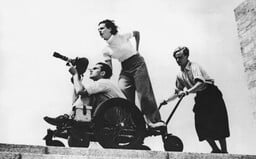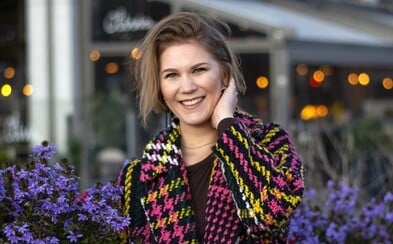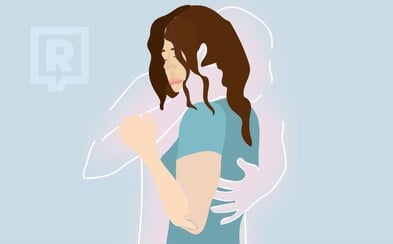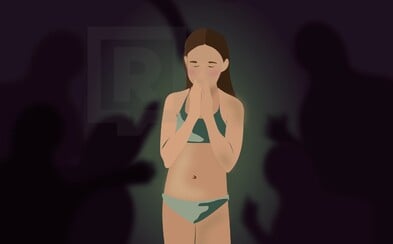 Filip visited the abandoned Soviet Baikonur Cosmodrome: The sight of the ruins of the most expensive space project is unreal
Filip visited the abandoned Soviet Baikonur Cosmodrome: The sight of the ruins of the most expensive space project is unreal
Filip visited the abandoned Soviet Baikonur Cosmodrome: The sight of the ruins of the most expensive space project is unreal
Filip visited the abandoned Soviet Baikonur Cosmodrome: The sight of the ruins of the most expensive space project is unreal
I Am Not Like Other Girls, I Prefer To Be Friends With Boys. How Society Leads Women to Self-Hate
Girls only like drama, gossip and shopping, I prefer to be friends with boys. I'm different, I'm not like other girls. And I also internalized misogynistic attitudes.
If problems persis, please contact administrator.

"When I like a man and there are women around him, I immediately start comparing them to myself, usually according to the parameters of 'stereotypical' beauty. For example, I think to myself: 'This woman is pretty in the face, but she's a little fatter than me.' Or: 'This woman is only pretty because she uses makeup,'" 29-year-old Veronika told Refresher.
That being said, in her head she has the tendency to knock down the women around her. Compete with them. “When my superior is a woman, I have less respect for her than for a man. Although I don't want it to be this way. With a superior man, I have an inner feeling that he has more influence over my fate, as if I secretly believe that he is more competent. At the same time, I take the criticism of a superior man as well-intentioned advice from a more experienced person, whereas with a woman I tend to take it personally," she reflects.
She also tends to value women who have – as she puts it – “more masculine qualities”. That is, the qualities that society considers masculine: "cool head", logical thinking, sense of humor, insight.
Veronika internalized misogynistic patterns of thought and behavior. In other words, she has ingrained her hatred or prejudice against women. And she is not alone. Internalised misogyny affects many of us, including the women who shared their experiences with Refresher.
I knock down her value
Terms such as "pick me girls" or "guardians of the patriarchy" have been coined for such women. They subconsciously project sexist thoughts onto other women, and often even onto themselves. In addition to putting each other down, judging or comparing, they often believe that women generally lack logical thinking or a sense of direction, are worse drivers, that their main role is raising children and/or that they are only interested in make-up and gossip.
Maybe they don't even believe it themselves, and internalized misogyny is just a form of self-protection in a "man's world". Trying to prove that the prejudice boxes don't apply to me. I'm different from other girls.
However, the very label "pick me" can also be understood from a certain point of view as a manifestation of internalized misogyny. It can sound paternalistic and condescending. We should be aware of this when using it. At the same time, according to experts from Gender Studies, the "pick me" strategy is understandable within the framework of freeing oneself from binding gender roles - as a result, however, gender-diverse societies rather stand in the way.
I'm used to fighting for men's attention. I take women's attention for granted.
According to Veronika, such attitudes may stem from the fact that she previously tried to please her partners. She always looked for faults only in herself, as if only the woman was responsible for the emotional stability of the relationship. “I get angry at women who are too 'distressed' in their relationship with their partner. It seems to me that they are not themselves enough and that they are not 'interesting' enough for a partner. At the same time, I tend to downplay the fact that the partner usually does not give such women enough space to express themselves or simply does not see their uniqueness and does not value them," she says.
At the end of her statement, Veronika adds one more important thing that is characteristic of the phenomenon of internalized misogyny: "I consider expressions of sexuality in women as embarrassing, in men I take them as a symbol of self-confidence." She feels embarrassed for any woman who comes dressed "challengingly" and openly flirts with a man. “I immediately start knocking down her value and linking it to her psyche. I'm like, 'Can't she pick up a guy without sexually explicit innuendo?'" she adds.
You are not born a woman, you become one
According to expert Agáta Hrdličková from the Gender Studies organization, internalized misogyny is not a phenomenon that arises only within one lifetime. It is preceded by thousands of years of the organisation of society, where being a woman was always of lesser value than being a man.
Behind internalized misogyny is the patriarchal culture in which we grew up, in which we live - and which has ensnared us. And from which it is difficult to break out. “We are not born a woman, we become one,” wrote feminist thinker Simone de Beauvoir in her iconic 1949 book The Second Sex. Similarly, a woman is not born with misogynistic attitudes. Misogynistic women were created by a misogynistic society.
Our thinking is not formed in a vacuum - on the contrary. It is thoroughly influenced by the society, environment and time in which our individual "self" is formed. And since our society operates within patriarchal structures, many sexist attitudes and values are automatically internalised by most of us – often unknowingly or unintentionally.
As the Romanian academic Sorana-Alexandra Constantinescu states in her work: "Women who were born into a society that devalues them as women, have the ground ready for internalizing their oppression from birth." This is also confirmed by Hrdličková from Gender Studies - the conditions, in which we grow up and live with affect how strongly our internalized misogyny manifests itself, or whether we have the opportunity to dissect, analyze and get rid of it.
According to experts, internalized misogyny consists of two main elements: self-objectification (or self-dehumanization) and passive acceptance of gender roles. The so-called benevolent sexism, which "more kindly and gently" justifies the privileged position of (some) men in society, is complicit in this.
However, the extent to which internalized sexism occurs in women is difficult to determine, as these tendencies are often unintentional. However, a 2009 study found that women verbalised internalised sexism an average of 11 times in every ten minutes of conversation.
Professional works investigating the prevalence (predominance) of internalized misogyny in women use a 17-item scale, the so-called "Internalized Misogyny Scale", which measures the internalized cultural devaluation of women. The scale captures, for example, highlighting men's achievements over women's, attributing stereotypical characteristics and behavior, or feeling unfounded mistrust towards all women in general.
Agáta Hrdličková adds that internalized misogyny manifests itself to a certain extent in most people, although these are rather "subtle signs" of it. "For example, we see a poorly parked car and we think, 'It must have been a woman.' Additionally, if as women we gain social recognition for being able to 'appreciate' such sexist jokes, then we are all the more likely to seek them out and internalise them," she explained to Refresher.
I'm not like other girls. Or am I?
As already mentioned, the editors of Refresher also conducted a small survey. We did not use any scale, but rather a questionnaire that we shared on various platforms, including our Instagram. A total of forty people between the ages of 17 and 45 took part in it. We asked them if—and how—internalized misogyny manifests in their own behavior and/or thinking.
Twenty-year-old Anna has begun rooting out the manifestations of internalized misogyny (which she refers to as a "crazy tangled web of thought processes, norms, and values") in herself over the past few years. "It's not about one aha moment, on the contrary - I realize something new every day. Some new idea, an area that is not a reflection of my free self, but rather of being socialized as a girl from a young age," she reflects.
Anna notices specific manifestations of internalized misogyny in herself almost every day. Similar to Veronika, whose experiences were described in the introduction of the text, she describes that she has a "constant need to compete with women and compare herself with them".
Constantinescu also explains these thought processes, according to which women adopt racist, ageist or ableist standards of attractiveness, internalize them and use them as standards by which they evaluate themselves and others. (Ageism is prejudice based on age, ableism based on health disadvantage, editor's note).
"Women are much more likely than men to suffer from eating disorders, undergo medical procedures, or follow draconian diets in an effort to achieve or maintain certain standards of beauty," she writes in her work. Anna so often subconsciously perceives other women not as "companions or sisters, but as rivals."
"I project who is prettier, who is cooler. From a very young age, we are led to believe that women must compete with each other - remember, for example, competitions - to see who is more beautiful or who wins the favor of men. It's the rivalry between women that annoys me so much. And it's also very harmful, because then we don't organize and work together to destroy patriarchal values. On the contrary, we maintain them by competing with each other to see who will fulfill these values better. Among other things, it distracts us from what is really important in the world," she describes.
What do we want?
In addition, Anna notes how women are taught to judge and perceive their lives and their bodies through a cis male heterosexual lens: "I am incredibly annoyed by our constant need to modify the female body according to what turns men on. Women are not led to think of themselves as autonomous subjects, but often as objects of male desire and fantasy. 'Women's' magazines, internet articles and popular culture constantly advise us to consider how to best present ourselves as an object."
She still remembers the headlines from those "women's" magazines: "Ten ways to please your partner in bed", "Ten outfits in which he will not resist you". According to Anna, no one teaches women to ask themselves what they want.
Ever since she began to recognize these thought patterns in herself, she has been trying to work with them purposefully - and gradually break them down. But as she herself admits, it is not easy. A big topic for her is also how she approaches herself because of these patterns. She began to realize how it affected her relationship with sex.
"From the moment I started having sex, I felt like I was there to give sex to a man. To some extent, in the vast majority of experiences, I thought primarily of a man's pleasure and orgasm, not my own. For what he wants, what he likes. Not for what I want from the experience. For example, when I didn't want sex, I felt that I had to at least provide oral sex, because I felt that a man had a right to sex and it was my duty to provide it. No one teaches us women that sex is also about our pleasure and orgasm. Only from a certain age did I learn, thanks to certain partners, that sex is as much about me as it is about them," she confides.
According to her, the fundamental change took place at the moment when she learned that she did not have to provide sex to anyone. "That was a huge emancipatory moment for me," she recalls.
Anna also believes that since we are all socialised from a very early age to fulfil one of the genders -- that is, female or male --, and since for centuries being a woman or a man had a clear meaning and these roles were mostly seen as oppositional and binary, an internalised misogyny ingrained in all of us.
Outside the boundaries set by the patriarchy
In addition, the majority of respondents from our questionnaire stated that misogynistic thoughts appear to them "subliminally" and despite their true beliefs. In fact, they do not agree with them and resist them. They appear even though they are "trying to change their thinking and guide them in the right direction, to think fairly, outside the boundaries set by the patriarchy," as Ema described in the questionnaire.
A thought pops up in my head and I want to slap myself.
They would most often identify as "pick me girls" in primary and secondary schools. Back then, "girly" equaled "awkward" to them. They didn't wear pink or make-up and only hung out with boys whose approval they craved. A key moment when they realized the misogyny ingrained in their minds, but most can't pinpoint. For many, like Anna, it was a gradual realisation.
"I don't think it was one moment, rather it's a long-term process and I'm probably not at the end of it yet. As one becomes familiar with the issue, one begins to perceive that some ideas are rather taken over than from within," described Kateřina, who is thirty-seven years old, for example. But other women also learned about the phenomenon thanks to feminism, older sisters, friends, the media and university.
But in Rebecca's words, "It's quite painful to be aware of it and gradually remove these layers of thought."
The uncovering of misogynistic patterns can cause an avalanche of awareness of a whole range of wrongs that we blindly believed. “I fell in love with women who had everything I seemed to despise—wearing make-up, feminine clothes, not trying at all costs to appear smart like my then-self. When I realized that I was attracted to women, I felt that I should treat women like cishet men - with a certain superiority. That I should 'pick them up', discuss them in detail with my friends, that I should be hurt and try to humiliate them when they reject me," an anonymous person described in the survey.
However, they did not perceive this approach as authentic and formed strong friendships with women. "Falling for feminine people made me think more about whether I respect them enough — and whether I respect myself when I like someone like that," they added.
Freedom awaits us on the other side
According to Hrdličková, internalized misogyny is at the core of gender stereotypes. But it can easily lead to radicalism and xenophobia. "Everyday small innuendos, stereotypical jokes and the absence of self-reflection can result in gender-based violence involving manifestations such as cyberbullying by girls on girls," she describes, noting that misogyny, homophobia, transphobia and anti-gender movements are on the rise across Europe.
According to her, political representation also plays a part in this - either by rejecting the Istanbul Convention and same-sex marriages, or by insisting on the sterilization of trans people. "All this supports the internalized misogyny in all of us and at the same time complicates all the possibilities of how to fight against it in ourselves," adds Hrdličková.
As described by almost all respondents, breaking down internalised misogyny is often a long process. However, it is not impossible. According to Hrdličková from Gender Studies, the first step is to find out what internalized misogyny actually is. To talk about it and examine how it manifests itself in our country. The expert also advises reading feminist texts, learning about diversity and people's stories, and developing sensitivity to and confronting misogyny.
As twenty-eight-year-old Anna proves, freedom can await on the other side of the deconstruction of patriarchal values and internalized misogyny. "It's terribly satisfying to reject things that don't suit us, that hurt us, but that society requires of us," she concluded her statement.
If problems persis, please contact administrator.




















